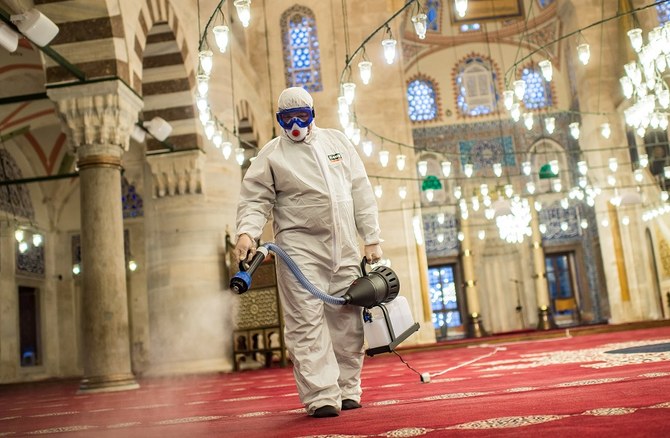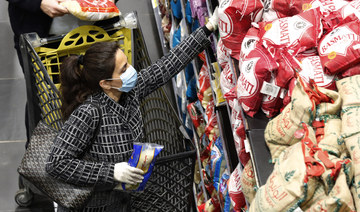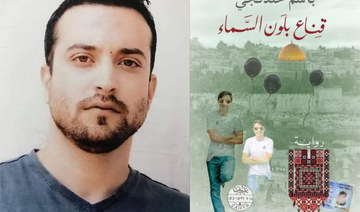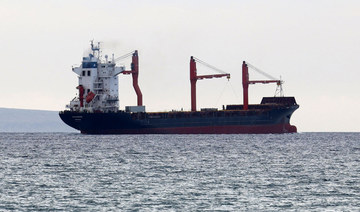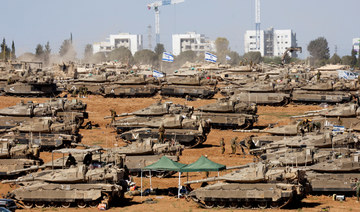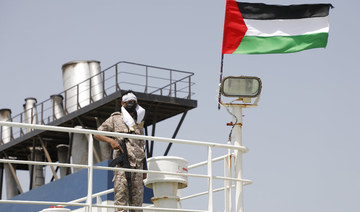DUBAI: Governments in the Middle East and the rest of the world have taken more precautionary measures to combat the spread of the coronavirus, including travel restrictions, work and class suspensions and quarantines.
Thursday, March 12 (All times in GMT)
20:36 - Qatar closes gyms, cinemas, theaters, museums and children's areas over coronavirus concerns.
20:32 - Saudi Arabia suspended the holding of events in wedding and function halls and hotels over coronavirus fears. The ban will come into effect on Friday, the interior ministry said.
19:53 - US President Donald Trump came out Thursday as the first foreign leader to suggest delaying the Tokyo Olympics because of coronavirus, dropping a bombshell on his "good friend" Japanese Prime Minister Shinzo Abe.
"Maybe they postpone it for a year," Trump told reporters in the Oval Office, 19 weeks before the opening ceremony in Tokyo's Olympic Stadium.
19:45 - Kuwait announced eight new cases of coronavirus, bringing the total number of cases in the country to 75.
19:30 - Latest death toll in France from coronavirus stands at 61 as president Emmanuel Macron says the country will close its frontiers if necessary but only in coordination with the EU.
19:10 - Iran on Thursday reported 75 new deaths from the coronavirus in the past 24 hours, the health ministry said, bringing the death toll to 429 in the worst-hit country in the Middle East.

People walk past shops along an alley at the Tajrish Bazaar in Iran's capital Tehran on Mar. 12, 2020. (AFP)
19:00 - Sudan suspended flights and closed its land border with Egypt on Thursday, in efforts to prevent the arrival of the new coronavirus pandemic, a government statement said.
Flights from China, Iran, Italy, Spain, Japan and Egypt were halted, according to the statement from the council of ministers.
18:45 - A top adviser to Iran's utmost authority Supreme Leader Ayatollah Ali Khamenei has been infected with the new coronavirus, the semi-official Tasnim news agency reported on Thursday.
"Ali Akbar Velayati, who also is the head of Tehran's Masih Daneshvari hospital, had contacts with many coronavirus patients in past few weeks. He has been infected and is under quarantine now," Tasnim reported.
18:30 - Egypt's health ministry reported 13 new coronavirus cases and one new death on Thursday.
18:25 - UEFA will hold a crisis meeting next week, European football’s governing body announced on Thursday, as the coronavirus pandemic threatens to force the postponement of Euro 2020 and wreaks havoc with the ongoing Champions League. FULL STORY HERE.
18:15 - Saudi Arabia announced the postponement of the Arab-African and Saudi-African summits that were due to take place in the first quarter of 2020 over coronavirus fears.
Opinion
This section contains relevant reference points, placed in (Opinion field)
17:20 – Italy's death toll passed 1,000, with 189 new fatalities taking its toll in just over two weeks to 1,016, second behind China according to official figures.
17:15 – Britain's chief scientific adviser Patrick Vallance said between 5,000 and 10,000 people in the UK could be infected with the novel coronavirus even though only 590 cases have been confirmed.
His estimate came as Boris Johnson stepped up the response, moving to the so called "delay phase" which includes the option of more stringent measures designed to slow down the spread of the virus.
16:40 – Turkish primary and secondary schools will be closed for a week from March 16, while universities will be closed for three weeks due to coronavirus, presidential spokesman Ibrahim Kalin said on Thursday.
16:20 – Canadian Prime Minister Justin Trudeau is self-isolating at home after wife has exhibited flu-like symptoms. Trudeau's office said Sophie Grégoire Trudeau returned from a speaking engagement in the United Kingdom and began began exhibiting mild flu-like symptoms including a low fever late Wednesday night. She is being tested for COVID-19 and is awaiting results.
The statement said “Out of an abundance of caution, the prime minister is opting to self-isolate and work from home until receiving Sophie's results.”

14:55 - The UK announced on Thursday that its death toll had reached 10 people, and that its total number of cases had risen to 590 from the 456 figure announced on Wednesday.
While Premier League matches are still scheduled to take place this weekend, Leicester City manager Brendan Rodgers said some of his players had shown symptoms of coronavirus and have been "kept away from the squad."

People walk across London Bridge as Britain braces itself for an increase in cases of the Coronavirus. (AFP)
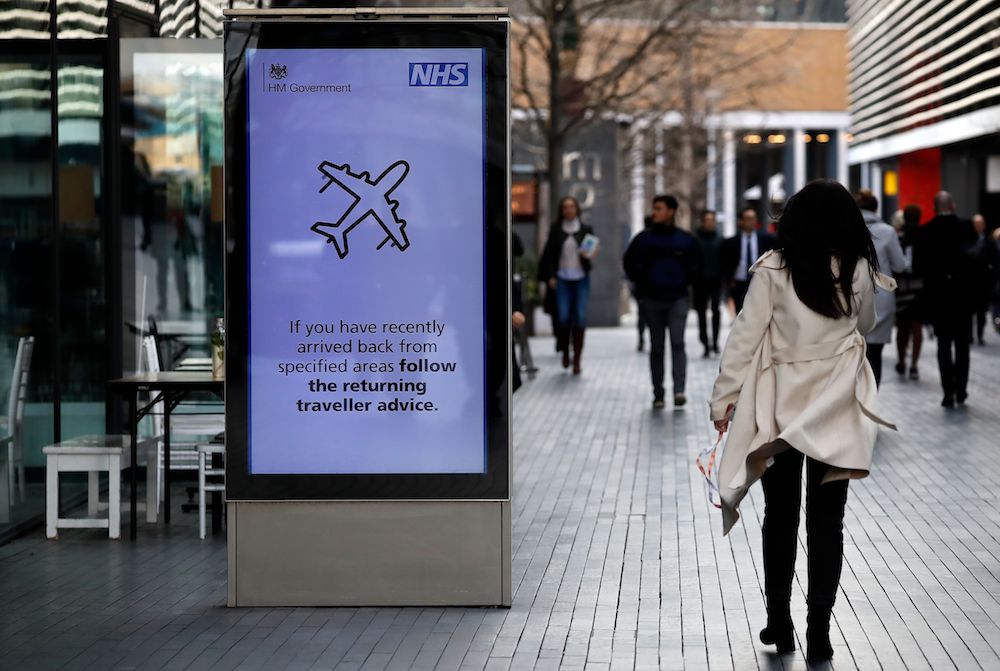
People walk pass an information board giving the public information on steps to help the country cope with the Coronavirus outbreak, on March 11, 2020 in central London. (AFP)
14:15 - People who are in isolation to prevent the spread of coronavirus should not attend congregational prayers, Saudi Arabia's Council of Senior Scholars said on Thursday.
14:00 - Algerian President Abdelmadjid Tebboune has ordered schools and universities to close until April 5 to slow the spread of the coronavirus, state media reported on Thursday, after the country's first registered death from the disease.
Algeria has confirmed 24 cases of coronavirus, mostly among members of a single family in the city of Blida, south of the capital.
13:45 – The head of US Central Command, Gen. Kenneth McKenzie, said Iran is significantly underreporting the number of its coronavirus victims and he believed that the global pandemic is making Tehran more dangerous, a day after an attack in Iraq that killed US and British troops.
13:25 – Philippine President Rodrigo Duterte on Thursday announced a halt on domestic land, sea and air travel to and from Manila, as well as community quarantine measures, in what he called a ‘lockdown’ of the capital to arrest the spread of coronavirus.

Duterte approved a resolution to allow a raft of containment measures including bans on mass gatherings, a month of school closures and quarantining in communities. (AFP)
12:55 – Saudi Arabia said flights to and from the UK would continue. Saudi earlier suspended flights to and from Europe and Middle Eastern destinations.
12:30 – Spain has confirmed 84 deaths from the coronavirus outbreak versus 47 on Wednesday, the country’s health ministry said.
12:00 – Bahrain’s Ministry of Interior said Tehran’s failure to stamp Bahraini passports allowed the spread of coronavirus outside of Iran. This behavior is considered a biological attack under international laws, the ministry said.
11:45 – UAE health officials reported 11 new coronavirus cases, bringing the number of cases to 85. All recent cases were confirmed through early detection measures and during quarantine. The patients are of different nationalities: two from Italy, two from the Philippines and one each from Montenegro, Canada, Germany, Pakistan, UAE, Russia and UK.
#UAE Health Ministry has announced 11 new #COVID-19 cases, bringing the total to 85 in the country. Individuals are currently in a stable condition and are receiving all necessary health care required.#WamNewshttps://t.co/S2cyiFqHhw pic.twitter.com/TyKAJPtO4Z
— WAM English (@WAMNEWS_ENG) March 12, 2020
11:35 – Ireland on Thursday announced the closure of all schools and colleges, and recommended the cancellation of mass gatherings as part of measures to combat the spread of the coronavirus.
Prime Minister Leo Varadkar said “schools, colleges and childcare facilities will close from tomorrow,” as would cultural institutions.
Indoor events of more than 100 people and those outdoor involving over 500 “should be cancelled,” Varadkar added.
11:20 – The top UN rights body decided Thursday to suspend its main annual session at the end of this week over the new coronavirus pandemic.
A proposal presented by Human Rights Council president Elisabeth Tichy-Fisslberger “to suspend the 43rd session of the Human Rights Council on the 13th of March until further notice,” was met with no objections.
11:15 – Poland has reported its first death from coronavirus, authorities said. So far 47 cases of coronavirus have been confirmed.
11:05 – Dubai airline Emirates has suspended more flights after the WHO declared the coronavirus crisis a pandemic. Services to the following destinations were cancelled: Fort Lauderdale: March 13 to March 31; New York JFK – Milan: March 11 to April 3; New York EWR – Athens: March 13 to April 3; Venice: from March 12 to April 3; Milan: March 13 to April 13; Bologna: March 13 to April 13; Rome: March 14 to April 13 and Kuwait: from March 14 to March 31.
10:55 – There are now 2,078 coronavirus cases in Germany, Welt newspaper has reported, citing John Hopkins University statistics.
10:35 – Iran reports 1,075 new coronavirus cases in the past 24 hours, and deaths have risen to 429.
10:30 – The Dubai government has allowed public sector employees to work from home via a remote work system as a precaution against coronavirus. Dubai authorities also banned the serving of shishas in cafes in the emirate.
#Dubai Government directs all shisha cafes and coffee shops to stop serving Shisha immediately for 2 weeks as a precautionary measure. pic.twitter.com/1bILyUtvFt
— Dubai Media Office (@DXBMediaOffice) March 12, 2020
10:20 – Rome authorities said they would shut Ciampino airport and close the terminal at Fiumicino as Italy contends with a coronavirus outbreak.
10:00 – Spain’s Equality Minister Irene Montero was diagnosed with coronavirus and Deputy Prime Minister Pablo Iglesias was quarantined.
Spanish cabinet meeting scheduled for Thursday will only be attended by ministers whose presence is needed to approve new coronavirus measures and all other upcoming Spanish Prime Minister Pedro Sanchez’s meetings will be held via video conference.
09:10 – Slovenia plans to close all schools from Monday in order to prevent the spread of the coronavirus, Prime Minister Marjan Sarec said on Thursday.
“This decree is necessary...in this situation,” Sarec said on social media, giving no details on how long the schools will be closed.
Slovenia has so far confirmed 57 cases of coronavirus.
09:05 – Coronavirus death toll in Lebanon has risen to 3, authorities have reported.
09:00 – Iran has asked the International Monetary Fund for emergency funding to help it fight the coronavirus outbreak, which has hit the Islamic Republic hard, Foreign Minister Mohammad Javad Zarif said in a tweet on Thursday.
07:55 – Algeria has registered its first death from the coronavirus, the health ministry announced on Thursday.
No further details on the death were provided in the ministry statement, cited by the official APS press agency. Another five new cases of COVID-19 have been recorded, bringing the total number of confirmed cases on Algerian soil to 24, the ministry added.
A 25th case -- and the first registered in the country -- concerns an Italian who tested positive in February but who has since left Algeria.
Of the five new cases announced on Thursday, two are Algerians who had been in France. They have been hospitalised in the Souk Ahras area of eastern Algeria, and the Kabylie region east of the capital Algiers. The three others were being treated in a hospital in the Blida area, southwest of Algiers, the health ministry said.
Already in Blida, 17 members of the same family had been infected with the virus, in connection with confirmed cases among Algerians in France. The health ministry urged all Algerians planning to travel to countries where the novel coronavirus is active to defer their trips, and for Algerians returning from those countries to postpone "family visits unless absolutely necessary".
07:45 – The Kuwait health ministry said five coronavirus patients have recovered, but eight new cases were recorded in the past 24 hours, five of them were Egyptians. A total 75 patients were receiving treatment, and one case was in critical condition, the ministry said.
07:30 – China has passed the peak of the coronavirus epidemic, the National Health Commission said on Thursday. The comments were made by commission spokesperson Mi Feng at a news conference.
07:10 – The UAE government has urged citizens to avoid traveling to India due to coronavirus fears, state news agency WAM reported.
The warning came after India said they will not allow any visitors with Indian visa into the country.
#الإمارات تهيب بمواطنيها عدم السفر إلى #الهند حرصا على سلامتهم وذلك في ظل انتشار فيروس #كورونا المستجد في عدد من الدول#وام pic.twitter.com/lBjKR8YiN3
— وكالة أنباء الإمارات (@wamnews) March 12, 2020
06:30 – The EU will on Thursday assess the travel ban on Europe imposed by US President Donald Trump, European Council President Charles Michel said, adding: “Economic disruption must be avoided.”
The tweet by Michel, who coordinates action by the leaders of the EU’s 27 member states, followed an overnight decision by Trump to suspend travel from Europe — but not Britain which is no longer part of the bloc — to the US for 30 days in a bid to stop the spread of the new coronavirus.
06:05 – The Omani embassy in New Delhi said nationals who wish to travel to India should wait until the coronavirus situation is under control. “We would like to inform that the Indian government has issued a decision to cancel the entry visas due to the outbreak of the Coronavirus, and citizens who wish to travel should wait until the situation is under control,” the embassy said in a statement.
05:40 – South Korea reported 114 new cases of the coronavirus and six more deaths, resuming a relative decline in new cases after a spike the day before. The new cases bring the country’s total to 7,869, with 66 deaths, the Korea Centers for Disease Control and Prevention said.
05:35 – The Kuwait Stock Exchange has suspended its operations.
05:25 – Australia’s government said it would pump $11.4 billion (A$17.6 billion) into the economy to try to stop the coronavirus outbreak triggering a recession, as it weighed an extension of travel restrictions following a formal pandemic declaration. Further to halting to the disease spread, the Australian government said it would extend by a week existing travel bans on China, Iran, South Korea and Italy, which have reported higher numbers of people with the illness, while an emergency health committee would review whether to place a travel ban on all of Europe.
04:05 – Thailand reported 11 new coronavirus cases on Thursday, bringing the total number of cases in the Southeast Asian country to 70, health officials said.
All of the new patients had socialized and shared drinks, health officials said, adding that a tourist from Hong Kong had been the source of the infection.
“The Hong Kong tourist came alone and already went back. The 11 infected are all Thai,” said Sopon Iamsirithawon, director-general of the Communicable Diseases Department.
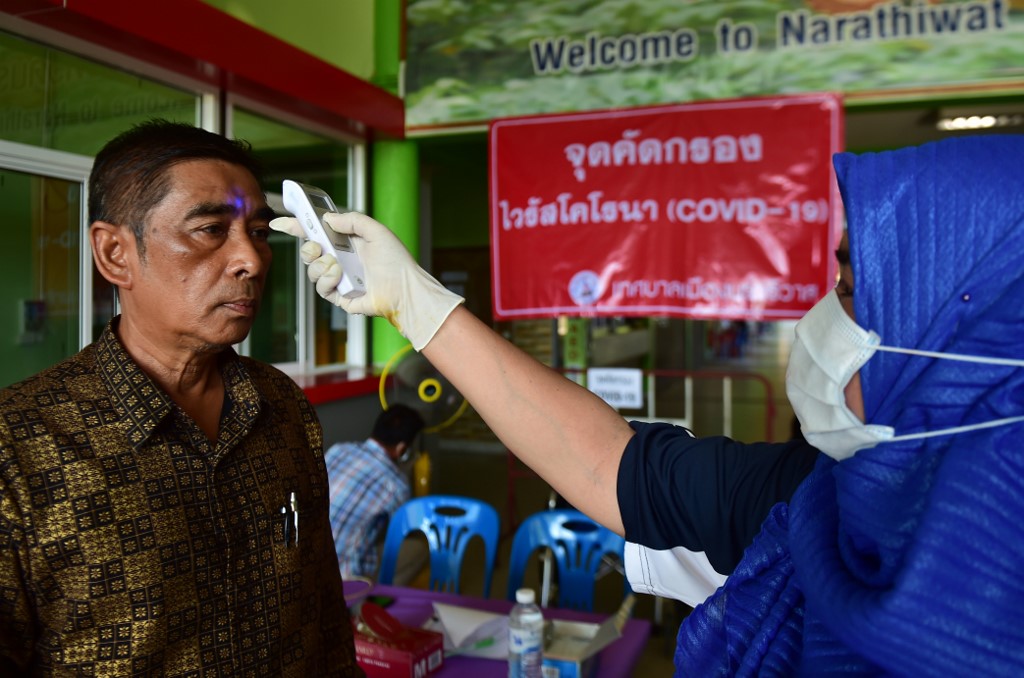
A bus station staff member takes the temperature of a passenger before he boards his bus in Thailand’s southern province of Narathiwat on March 11, 2020. (AFP)
04:40 – Greece reported its first fatality from a coronavirus infection on Thursday, a 66-year old man who had returned from a religious pilgrimage to Israel and Egypt at the end of February.
The deceased had underlying health issues, the health ministry said in a statement. There were 99 confirmed cases of coronavirus in Greece by late Wednesday.
03:50 – The Abu Dhabi government said in a tweet on Thursday that it activated a remote work system for some of its employees, “to ensure the smoothness and efficiency of all procedures, in order to accelerate the digital transformation.”
Abu Dhabi government activates the "remote work" system for some of its employees, thanks to its advanced technical system and technological readiness, to ensure the smoothness and efficiency of all procedures, in order to accelerate the digital transformation
— Abu Dhabi Government Media Office (@admediaoffice) March 12, 2020
02:00 – The NBA has suspended play starting on Thursday after a Utah Jazz player preliminarily tested positive for the new coronavirus.
NBA To Suspend Season Following Tonight's Games pic.twitter.com/2PTx2fkLlW
— NBA (@NBA) March 12, 2020
Wednesday, March 11 (All times in GMT)
20:00 – Kuwait’s ministries of interior and information have filed lawsuits against people spreading rumours about the coronavirus outbreak on Wednesday.
“We will not tolerate those who spread rumors and they will be held accountable,” Deputy Premier, Minister of Interior and Minister of State for Cabinet Affairs Anas Al-Saleh said.
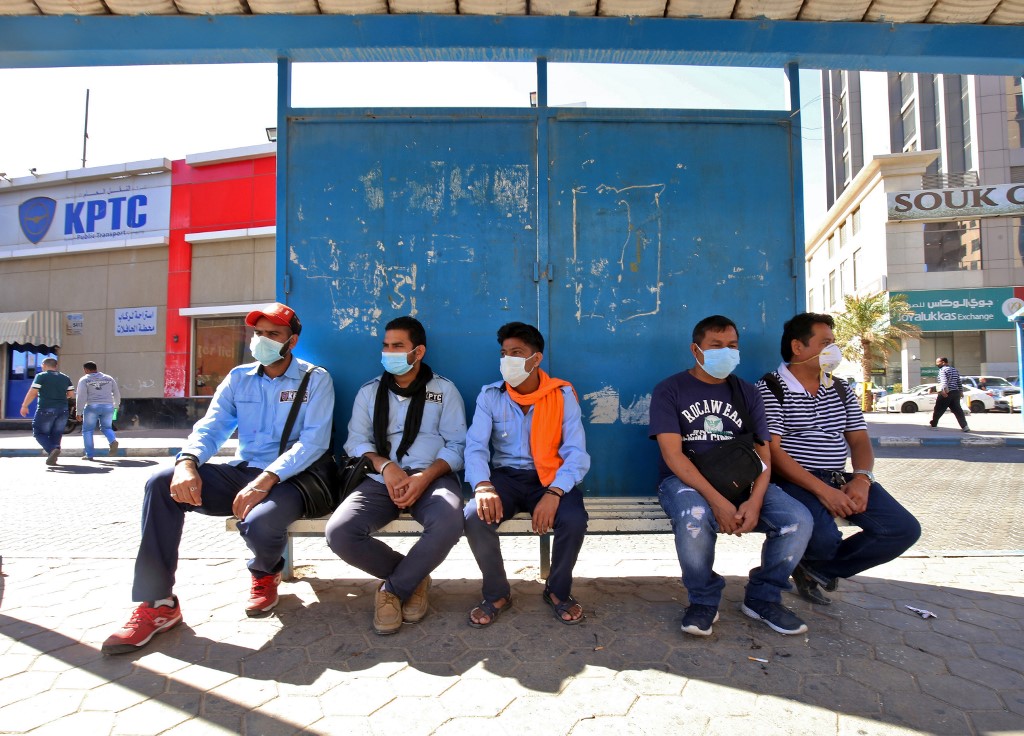
People wearing protective masks wait at a bus station in Kuwait City. (AFP file photo)
18:25 – The Royal Oman Police on Wednesday started a coordinated plan that aims to end the spread of COVID-19 and ensure the country’s officers continue to serve the people in a timely manner.
The plan includes training and educating police officers to avoid the spread of infection among its staff, as well as providing protection and virus testing devices.
18:15 – Morocco reported its sixth coronavirus case, a Senegalese patient who arrived from France to the city of Fes.
This video explaining how COVID-19 transmits person to person was produced by the World Health Organisation
17:15 – Kuwait has banned of gatherings at restaurants and coffee shops, including those inside shopping malls.
16:55 – The Kuwaiti government said it will suspend work in all government departments starting Thursday and to be resumed on March 29, the government spokesman said.
16:05 – Bahrain’s health ministry announced five coronavirus recoveries bringing the total number of recoveries in the country to 35.
15:20 – Abu Dhabi’s Department of Culture and Tourism has ordered the banning of serving shisha in all hotels and tourism facilities as a precautionary measure against the spread of coronavirus.
15:10 – Oman Air said on Wednesday it will temporally suspend all flights to Saudi Arabia to prevent the spread of the new coronavirus.
— Oman Air (@omanair) March 11, 2020
14:35 – Kuwait’s health ministry reported three coronavirus recoveries in the country. This brings the total number of recoveries to five.




